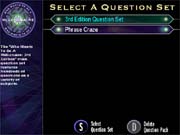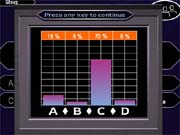The Who Wants to Be a Millionaire computer game concept feels about as listless as its host Regis Philbin now sounds in this unrevised sequel. When the irrepressible pitchman starts the game with his familiar cry, "Who Wants to Be a Millionaire...Third Edition," even he sounds bemused that the publisher is milking the show's waning popularity yet again.

It seems as if not one line of programming code has been changed this third time out since the previous installment. To its credit, the basic Millionaire game engine has always been a competent translation of the prime-time experience. On a nicely animated version of the TV set, you respond via keyboard commands to an increasingly difficult list of multiple-choice trivia questions. While Regis doesn't read the individual questions, his characteristic urgings and chides are piped in as you make your way up the money tree to the $1 million question. The topic mix (familiar phrases, pop culture, sports, science, history, and so on) is all here, and unlike in previous editions, this question set doesn't seem as dominated by TV trivia.
The lifelines are handled creatively. Phoning a friend for help gives us a cute exchange with one of Regis' apparently endless collection of oddball acquaintances (from circus clowns to grease-monkey savants). They may or may not provide you with the right guess, although you can often get a pretty good read on the accuracy of the guess from the nature of the exchange between Regis and the friend. The 50/50 option eliminates two of the possible four answers for a question, and the poll-the-audience lifeline uses actual response data from test audiences.
The only revision in this third edition is a fresh set of trivia questions and the new ability to download additional question sets from the game's home Web site. Currently, only one specialty question set on famous phrases is available online, which seems either stingy or lazy since this is the only new feature of the new edition. Worse, this set turns out to be really only a single run of 15 questions that can be played once--not a full library of sets that can be played repeatedly without encountering the same question twice. Also, considering the game's target audience of casual consumer gamers, the procedure for downloading these new questions is surprisingly awkward. The software launches the default Web browser and makes you download the appropriate file, then seek it out on your hard drive to install it manually. Less experienced home users deserve a more seamless installation in which the game engine does most of the work.
All of this speaks to the basic laziness in the design of the third edition of Who Wants to Be a Millionaire. The game engine always struggled to make the gameplay experience more interesting than a multiple-choice questionnaire, which is all the game is in the end. Zooming in on the winner's circle and including the melodramatic soundtrack from the show were welcome decorations the first time out. But it's surprising that the designers have made no effort across these two sequels to break from the now familiar and tedious gameplay in the slightest. After all, they have how many episodes of the TV show's sound and video tracks to play with? Why not add in video clips of audience reactions to players winning or losing in order to enhance the TV-like experience? The only reward for climbing the money ladder is the same visual of a check made out to you. Surely buyers of this game are fans of the show; wouldn't they love a video archive of actual million-dollar winners?

Two weaknesses of the series remain unfixed: a worthless fastest finger routine and an absent online component. In this version, the fastest finger mode is a vain attempt to re-create the elimination round that qualifies a player for climbing the question ladder in the actual show. Using different parts of the same keyboard, two players compete to be the first to put a set of occurrences in chronological order. With only two people, the exercise seems gratuitous. It also misses the opportunity to enrich the game with a new multiplayer mode that could allow head-to-head competition over a given set of 15 questions. Likewise, the designers continue to ignore the very good live Millionaire game hosted at the Disney-ABC Web site, where hundreds of thousands of users compete against the on-air contestants in real time during the telecast. This online version is actually more fun and more intense than the CD-ROM game, but Buena Vista misses an opportunity to improve the CD-ROM version by integrating with this wildly popular online version.
Even Regis seems tired this time around. While earlier editions had the freshness of his unlikely celebrity, the host's interjections are now less frequent and less entertaining. Phrases like, "That's the answer you're sticking with, eh?" and "Gonna go with the majority?" feel as if they're served up in shorter cycles now, suggesting that Regis spent precious little time recording new voice-overs for this one. Hard as it is to believe, the deep library of Regis' doggedly bland comments may have been one of the strengths of the first edition. It kept us playing.
Nevertheless, there is no denying that Millionaire will keep trivia fans' interest--at least for a while. After all, Who Wants to Be a Millionaire remains a decent pick-up trivia game. You can complete a round of gameplay during a 10-minute coffee break. But at this point in the series, the execution and the host are so familiar that the only appeal left is the trivia challenge itself, which is unfortunate. The designers of such games should be spending more, not less, creative energy on successive installments.